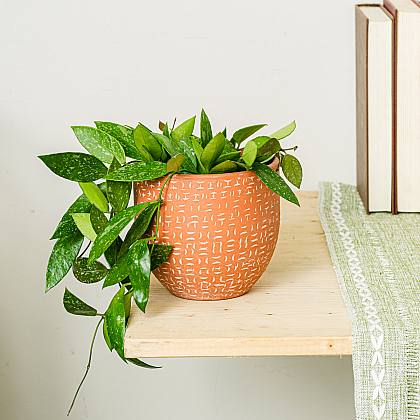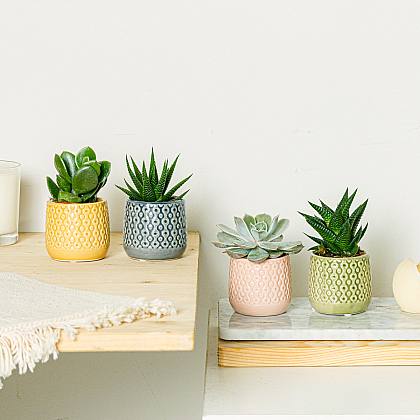Tips and tricks for beginners in the world of houseplants
In this article, you'll find practical tips and tricks for beginners in the world of houseplants. Discover the importance of having plants in our everyday lives, as well as the ideal species for those who are just starting out
In this article, you'll find practical tips and tricks for beginners in the world of houseplants. Discover the importance of having plants in our everyday lives, as well as the ideal species for those who are just starting out. Learn how to choose the perfect location for your plants and how to care for them properly, including tips on watering and basic care. Plus, discover the emotional and health benefits that plants provide at home. You'll also find solutions to the most common problems faced by plant care beginners. Finally, explore the art of houseplant decorating and discover creative tips for beautifying your home.
The importance of houseplants in our everyday lives
Houseplants are an important part of our everyday lives. In addition to their aesthetic beauty, these plants have many practical and emotional benefits. Houseplants help improve the air quality in our home by filtering toxins and pollutants from the air, which helps us breathe easier. They can also increase humidity in the air, which is especially helpful during the dry winter months. In addition, houseplants can help reduce stress and anxiety, providing a calm and relaxing environment in our home.
Maintaining houseplants can also be a fun and rewarding hobby for plant care beginners. Learning about different types of plants and how to properly care for them can be an educational and therapeutic activity.
In short, houseplants are not only beautiful and decorative, but they also provide many practical and emotional benefits in our daily lives. Keeping houseplants is an easy and accessible way to improve the air quality in our home, reduce stress and anxiety, and enjoy a rewarding hobby.
Ideal Houseplants for Beginners
If you're a beginner in the world of houseplants, it's important to choose those that are ideal for you. Some plants are easier to care for and require less attention than others. Here are some options that might be perfect for you.
The ideal first choice for beginners is the snake plant (Sansevieria). This plant is hardy and can survive in low-light conditions and with occasional watering. Plus, it helps purify the air, making it a great addition to any home.
Another recommended plant is the Christmas cactus (Schlumbergera). This plant blooms during the winter and only needs regular watering and indirect light to stay healthy. It's a low-maintenance plant and adds a pop of color to your space.
If you're looking for a hanging plant, English ivy (Hedera helix) is an excellent choice. It is sturdy and adapts well to different light conditions. You can let her grow in hanging pots or train her to climb a wall.
Finally, the spider plant (Chlorophytum comosum) is another ideal choice for beginners. It is an easy plant to care for, tolerates different levels of light, and has the ability to remove toxins from the air.
Remember that each plant has its own needs, so be sure to do some research on specific care before purchasing them. With these beginner-friendly options, you'll be able to enjoy the beauty and benefits of having plants in your home hassle-free.
How to Choose the Perfect Location for Your Plants
Choosing the right location for our houseplants is crucial for their growth and survival. First, we need to consider the amount of light they receive. Some plants need a lot of direct light, while others prefer partial shade or indirect light. It's important to read plant labels or do research online to find out what kind of light our specific plants need. In addition, we must take into account the temperature and humidity of the environment where our plants are located. Some plants prefer warmer, more humid environments, while others can survive in drier, cooler environments. It's also important to avoid drafty locations, as they can damage the leaves and cause the plants to dry out faster. Another important consideration is the size of the plant and the space available. Larger plants need more space to grow and may be too heavy for certain furniture or shelves. Finally, it's important to remember that our houseplants are not only decorative, but they also improve our quality of life by purifying the air and reducing stress. Therefore, choosing a visible and accessible location can help us enjoy our little green companions even more.
Tips for Properly Watering and Caring for Your Houseplants
Watering and properly caring for houseplants is critical to their health and growth. Here are some practical tips to help you do it effectively. First, it's important to determine how much water your plants need. Not all of them require the same amount, so you should research the specific needs of each species. In addition, it is advisable to water them with water at room temperature and avoid using chlorinated or too cold water. Another aspect to consider is the frequency of watering. Most houseplants benefit from regular, but not excessive, watering. You want to make sure that the soil is slightly moist, but not soggy. Also, it's important to note that some plants may require higher room humidity, so you can place containers of water near them or use a humidifier. Finally, pay attention to the sunlight your plants receive and avoid exposing them to hot or cold drafts. Remember that each plant has its own needs, so it's essential to observe them and adapt care as needed. With these simple and practical tips, you'll be able to properly water and care for your houseplants, allowing them to grow and beautify your home.
The Emotional and Health Benefits of Having Plants at Home
Having houseplants at home is not only a way to decorate our space, but it also has emotional and health benefits. Plants are able to improve our mood and reduce stress. Being surrounded by greenery gives us a sense of calm and tranquility, which is especially important in the hectic everyday life we lead. In addition, plants purify the air by absorbing carbon dioxide and releasing oxygen, thus improving the quality of the environment in the home. This can help prevent respiratory illnesses and maintain a healthier environment overall. It has also been shown that caring for plants can have positive effects on our self-esteem and sense of responsibility, as we take pride in seeing them grow and flourish thanks to our care. Therefore, having plants at home is not only aesthetically pleasing, but also contributes to our emotional and physical well-being.
Solutions to the Most Common Problems Faced by Plant Care Beginners
Beginners in houseplant care often face common problems that can seem overwhelming at first. However, there are practical and simple solutions to each of these problems. One of the most common problems is a lack of adequate light. Many houseplants need bright, direct light to thrive, so it's important to choose the right location for each plant. If your plant isn't getting enough light, you may want to consider moving it to a sunny window or adding artificial plant lights. Another common problem is over- or under-watering. It's important to research each plant's specific water needs and adjust watering accordingly. To avoid overwatering, make sure the pot has adequate drainage holes and avoid overwatering succulents. Pests can also be a common problem. If you notice small spots or cobwebs on your plants, you may have spider mites or spider mites. A simple solution is to regularly wipe the leaves with a damp cloth and use natural insecticides such as neem oil to keep pests away. With these practical and simple solutions, beginners can easily overcome common problems in houseplant care and enjoy the beautiful environment that these plants create in their homes.
The Art of Decorating with Indoor Plants: Creative Tips
Decorating with houseplants is an attractive and healthy way to beautify any space. There are many creative ways to incorporate plants into interior décor. A simple way is to group plants of different sizes and types in a corner or shelf to create a focal point. Planters can also be hung from the ceiling or walls to add dimension and depth to a space. Another option is to use plants as part of the table decoration, placing them in vases or decorative pots in the center. For those who are short on space, floating shelves or pot holders can be used to maximize the available vertical space.
Also, playing with colors can be an interesting way to decorate with houseplants. The bright green leaves are great for contrasting with white walls or light colors, while brightly colored flowers can add a vibrant touch to any room. Different textures and shapes can also be mixed to create a unique and personalized aesthetic.
It's important to remember that when choosing plants for décor, you need to consider their specific light and water needs. Some plants require plenty of direct sunlight, while others thrive in partial shade. Also, some plants need to be watered daily, while others only need to be watered weekly.
In short, decorating with houseplants can be a creative and healthy way to enhance any space. By incorporating different sizes, shapes, and textures, as well as playing with colors, unique and custom styles can be created. It's important to remember the specific needs of each plant when choosing them for interior décor.
In short, caring for houseplants can be a rewarding and enriching experience for beginners. Through the right choice of plants, the right placement, proper watering, and attention to common problems, anyone can become a successful gardener in the world of houseplants. In addition to beautifying our spaces, plants also provide us with emotional and health benefits, creating a calm and relaxing environment in our homes. And let's not forget the art of decorating with plants, which allows us to unleash our creativity and personal style.
However, beyond practical tips and care techniques, houseplants invite us to reflect on our connection to nature. In an increasingly urban and technological world, having plants at home reminds us of the importance of staying connected to the natural world. They teach us patience, responsibility, and respect for the life cycles of other species. In addition, they invite us to appreciate the beauty and diversity of the plant kingdom.
So why not take the first step and delve into the wonderful world of houseplants? It doesn't matter if you're a beginner or an expert, there's always something new to learn and discover. Plants are living beings that give us their presence and teach us valuable lessons. So go ahead, plant a seed of curiosity and watch your passion for houseplants blossom. You'll be amazed at what you can accomplish!


